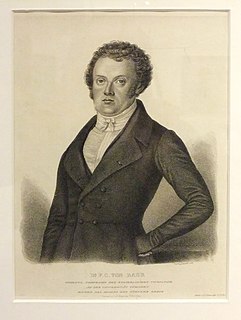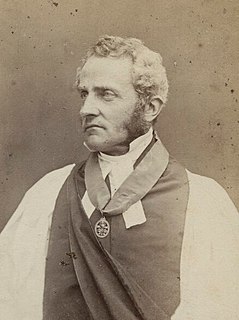A Quote by Ambrose
Stephen prayed for his persecutors, who had not been able even to listen to the Name of Christ, when he said of those very men by whom he was being stoned: "Lord, lay not this sin to their charge" And we see the result of this prayer in the case of the Apostle, for Paul, who kept the garments of those who were stoning Stephen, not long after became an apostle by the grace of God, having before been a persecutor.
Related Quotes
Christ prayed for those that crucified Him: 'Father, count not this sin against them; they know not what they do.' Archdeacon Stephen prayed for those who stoned him so that the Lord would not judge this sin against them. And so we, if we wish to retain grace, must pray for our enemies. If you do not find pity on a sinner who will suffer in flames, then you do not carry the grace of the Holy Spirit, but rather an evil spirit; and while you yet live, you must free yourself from his clutches through repentance.
The Apostle Peter preaching on the day of Pentecost of the risen Savior, says, "God hath made that same Jesus, whom ye have crucified, both Lord and Christ." And He speaks of Him as the anointed One, exalted at God's right hand. The Gospel is the Gospel of the Risen Christ. There would be no Gospel for sinners if Christ had not been raised. So the apostle says, "If Christ be not raised, your faith is vain; ye are yet in your sins"
Sir Thomas More was a victim of injustice and irony. Generously and meekly, just as he was about to be martyred, he said: Paul . . . was present, and consented to the death of St. Stephen, and kept their clothes that stoned him to death, and yet be they [Stephen and Paul] now both twain Holy Saints in heaven, and shall continue there friends for ever, so I verily trust and . . . pray, that though your lordships have now here in earth been judges to my condemnation, we may yet hereafter in heaven merrily all meet together, to our everlasting salvation.
What an honourable thing is it to be fishers of men! How great an honour shouldst thou esteem it, to be a catcher of souls! We are workers together with God, says the apostle. If God has ever so honoured thee, O that thou knewest it, that thou mightst bless his holy name, that ever made such a poor fool as thee to be a co-worker with him. God has owned thee to do good to those who were before caught. O my soul, bless thou the Lord. Lord, what am I, or what is my father's house, that thou hast brought me to this?
Well, I take great comfort in the words of the apostle Paul who said, ‘What I will to do, that I do not practice. But what I hate, that I do.’ And he said, ‘It is no longer I who do it, but the sin that dwells within me. But who,’ he asks, ‘will deliver me from this body of death?’ And he answers for himself and for me, ‘Through Jesus Christ the Lord.'
What kind of authority can there be for an 'Apostle' who, unlike the other Apostles, had never been prepared for the Apostolic office in Jesus' own school but had only later dared to claim the Apostolic office on the basis of his own authority? The only question comes to be how the apostle Paul appears in his Epistles to be so indifferent to the historical facts of the life of Jesus....He bears himself but little like a disciple who has received the doctrines and the principles which he preaches from the Master whose name he bears.
I love a statement by the apostle Paul, in the Book of Philippians in the Bible. I think the Corinthians had been writing to Paul, telling him that old men were chasing young women, nobody was tithing - and all that must have run Paul crazy. He wrote back and said, "If there be anything of good report, speak of these things." That's one of my principles.It's another discipline that I encourage myself to employ - to, as much as possible, say the courteous thing, and then be it.
A man who has been assiduous in acquiring the fruits of love will not cease loving even if he suffers a thousand calamities. Let Stephen, the disciple of Christ, and others like him persuade you of the truth of this (cf. Acts 7:60). Our Lord Himself prayed for His murderers and asked the Father to forgive them because they did not know what they were doing (cf. Luke 23:34).
A Christian man is on his guard with respect to those who philosophize according to the elements of this world, not according to God, by Whom the world itself was made; for he is warned by the precept of the apostle and faithfully hears what has been said, 'Beware that no one deceive you through philosophy and vain deceit, according to the elements of the world'
I had scarcely met Stephen, and then one Saturday I met some old friends for coffee, and they were saying, 'Gosh it's terrible about Stephen, isn't it?' They told me that he had been in St. Bartholomew's Hospital in London having horrible tests and then had been diagnosed with an atypical form of a rare disease - motor neurone disease.
The Psalter is the prayer book of Jesus Christ in the truest sense of the word. He prayed the Psalter and now it has become his prayer for all time...we understand how the Psalter can be prayer to God and yet God's own Word, precisely because here we encounter the praying Christ...because those who pray the psalms are joining in with the prayer of Jesus Christ, their prayer reaches the ears of God. Christ has become their intercessor.
Is there no reconciliation of some ancient quarrel, no payment of some long outstanding debt, no courtesy or love or honor to be rendered to those to whom it has long been due; no charitable, humble, kind, useful deed, by which you can promote the glory of God, or good-will among men, or peace upon earth? If there be any such, I beseech you, in God's name, in Christ's name, go and do it.
I understood Stephen's point of view because if you had been given a death sentence at the age of 21, would you find it easy to believe in a loving God? Also, Stephen's work was taking him into the depths of the universe, and it was, I thought, fairly understandable that there wasn't much room for God in his equations.









































